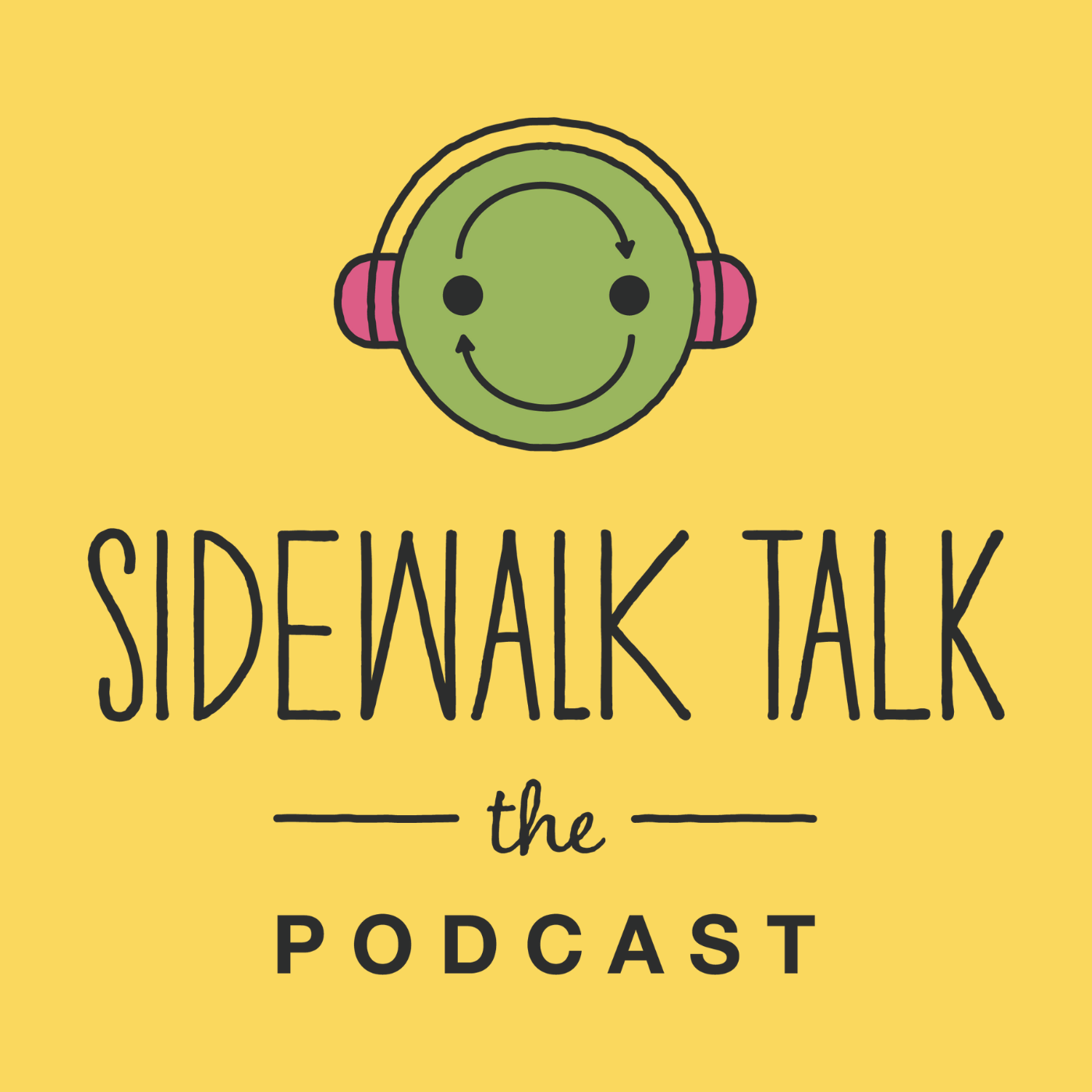
In a world that loves to talk, do, achieve, promote, preach, sell....what does it mean to connect, be, and listen. A podcast about #humanconnection #mentalhealth #socialhealth #empathy #belonging and #loneliness. And always thinking about justice and inclusion in all things. Join us. And share far and wide. Or start your own chapter of Sidewalk Talk in your community. www.sidewalk-talk.org
Episodes
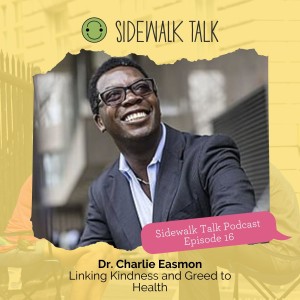
Tuesday Jan 14, 2020
Linking Kindness, Greed, and Health | Dr. Charlie Easmon
Tuesday Jan 14, 2020
Tuesday Jan 14, 2020
Stand Out Quotes
-
People are sold a false god of money, opportunity, or progression and some people achieve wealth and power but then realize that doesn’t bring me fulfillment.
-
Life always throws adversity at you. The challenge is how you adapt to that.
-
Ninety percent of our health has to do with the systems within which we are living, not something inside of us.
Biography:
Dr. Charlie Easmon is a Primary Care Physician specializing in Travel Medicine, Mental and Occupational Health. He trained at St George's Hospital Medical School in South London and performed his medical elective period in Ghana. Since then he has worked with a number of international medical organizations and charities including Merlin, Raleigh International and Save the Children in Rwanda, and ECHO in Armenia, Georgia, and Azerbaijan.
Working under appointment for the Foreign Office, Charlie has operated across Africa and in countries such as Egypt, Israel, Tunisia, Japan, Korea, Taiwan and the Philippines. He has been actively involved in a number of different types of medical aid emergencies including medical evacuations and following these high-level international experiences Charlie has some of the highest levels of expertise in travel medicine and public health.
However, Charlie’s deep interest is in mental and occupational health in the corporate setting, and particularly within high stress arenas. He has wide ranging experiences into the consequences of staff working in varying conditions. He is concerned about the aspect of late referrals and how the all-too-often lack of appropriate mental health support resources can impact on the well being of his patients.
Find more out about Dr. Easmon here:
https://www.lstmed.ac.uk/charlie-easmon
https://www.totalhealth.co.uk/clinical-experts/dr-charlie-easmon
And See Dr. Easmon's TEDx Talk here:
https://www.youtube.com/watch?v=INTlCAQJaro
Podcast Notes:
Dr. Easmon joins me as he makes his way home from his busy medical practice.
He says that ”These days people don’t come in for physical injury any more but because they have had their head caved in mentally. What is the point of human evolution if the workplace has become a stress pen for all of us?”
The western world has gotten many things wrong in their march for technological supremacy. His clients have forgotten to examine the quality of their life, joy, and peace.
And our mental health and physical health are suffering because of how our world is set up. You can treat the problems but Dr. Easmon also says we need to change the systems that are making us sick.
Ninety percent of our health has to do with the system within which we are living, not some problem inside of us but because the market rules mentality is what drives how we live. We are not creating health-promoting systems that would make us get well evolutionary.
Dr. Easmon shares his own experience of discrimination and how discrimination stress is linked to things like high blood pressure.
He is fond of the work of the Anne Frank Foundation. They send people into schools to talk about discrimination and strongly believes a history of prejudice should be taught in every school curriculum and teach it throughout history. And dealing with the rise of the far right. These groups thrive in vacuums of ignorance, but these groups directly and negatively impact our health.
Social innovation is not communist it is simply a way to create cooperation to create a society that is based on something other than greed. Not all mindsets can be changed so Dr. Easmon recommends we are thoughtful in where we put our energies. For him, he has partnered with George Kinder and the Golden Civilization Project. George will be on our podcast very soon.

We hope you enjoyed this dialogue with Dr. Easmon. As Sidewalk Talk has doubled in size since February of 2019 to today, we need 80 more folks to invest monthly to keep us providing free listening on sidewalks and this podcast in 2020. Upcoming and past guests include Harville Hendricks, Spring Washam, Parker Palmer, Charlie Easmon, David Kessler, George Kinder, Howard C. Stephenson, and Ashanti Branch and the list goes on. You can invest here or please share this conversation with all those who would be lifted up by it.
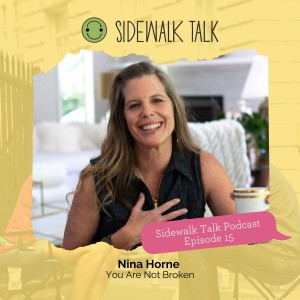
Monday Jan 06, 2020
You Are Not Broken | Nina Horne
Monday Jan 06, 2020
Monday Jan 06, 2020
Standout Quotes:
I used to believe effective communication was me finding exactly the right words to express what I needed to say but have learned it is about co-creating shared meaning with others.
I do not believe anyone is broken and believe in the inherent wisdom inside of people.
I had to unlearn anxiety to learn to become more relational.
About our guest, Nina Horne:
Nina Horne is founder and CEO of Samara Family Services, a company focused on building healthier teens and happier families through skill-building and mentoring: samarafamilyservices.com As a public policy expert, large-scale systems builder, and emotional health advocate, her goal is to ensure every teen and young adult has the skills needed to manage difficult times. Most important, she’s a mom who’s been there and back. At home, Nina teaches meditation in nature and is a reiki healer for underserved cancer patients in Oakland, CA.
Nina was born and raised in the deep south and grew up steeped in southern hospitality. But she is also a natural extrovert who was shaped by her genuine curiosity.
She believes that if she hasn't found something interesting in a conversation it was because she was asking the wrong questions.
After she left her higher education publishing career, Nina went on to become an Oakland City commissioner for Oakland, Calfornia but quickly learned that she didn't have all the tools she needed to make good decisions. So she took her natural curiosity and went back to grad school.
Nina soon found herself taking on very complex challenges for the UN, several White Houses, the EPA, and The State Department. She has used her many years of being a natural connector in representing the US in negotiating with other nations.
But her internal work was also a huge part of her learning. Hear how Nina's own work in therapy with her own anxiety using techniques like EMDR radically shifted her from being a connector to a more deeply related human. Nina has shepherded her own teen through anxiety and now helps families and teens navigate mental health - She has a heart for helping families and teens thrive.
You can learn more about Nina and Samara Family Servcie's work on their website here.
We hope you enjoyed this dialogue. As Sidewalk Talk has doubled in size since February of 2019 to today, we need 100 folks to invest monthly to keep us providing free listening on sidewalks and this podcast in 2020. Upcoming and past guests include Harville Hendricks, Spring Washam, Parker Palmer, Charlie Easmon, David Kessler, George Kinder, Howard Stephenson, and Ashanti Branch. You can invest here or share this conversation with all those who would be lifted up by it.
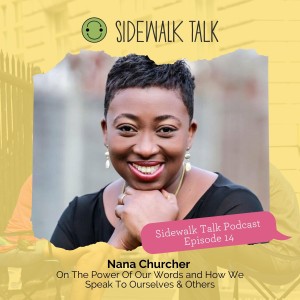
Tuesday Dec 24, 2019
On The Power Of Our Words and How We Speak To Ourselves & Others | Nana Churcher
Tuesday Dec 24, 2019
Tuesday Dec 24, 2019
Standout Quotes:
All of us have something to give to the world. There is greatness in you.
Our attention is so divided and that hurts me.
I believe each and every one of us have greatness but sometimes we need others to remind us to help bring it out in us.
Biography:
An influential voice in today's culture, she is regularly invited to inspire and motivate various women groups and conferences in the UK and Africa.
Nana has been nominated Best Media Personality by Women4Africa Awards, and her Talk Show was nominated Favourite Talk Show led by a woman by Screen Nation Awards in the UK.
Nana has also been to BET Experience to interview all international artists in LA.
Nana believes there is greatness in each and everyone of us. And dreams come true if you don't quit. Her catch phrase is "see you at the top."
Nana is a wife and a mother of four. She resides in London.
Nana is the model of walking around the world with an open heart. She is so interested in connecting that she finds her way to her award-winning show. Would she have met a videographer from Afghanistan if she hadn't been asking about someone's day? Would she find her way to professional footballers if she wasn't a natural connector.
Listen as you hear how she sees her show as an opportunity to bring the greatness out of people. She has a gift of getting people to open up. Listen, as she unearths why people open up to her.
"I make people feel important, no matter who they are. I give them all of my attention and presence."
Her ability to be genuine and totally present allows two spirits to connect. When she talks, you can hear that even in her talking, she is connecting.
We are so excited to bring you Nana Churcher's story. You can find out about Nana's book and show.
The Nana Churcher Show on YouTube Here.
Nana's Book, The Power of Your Word Here.
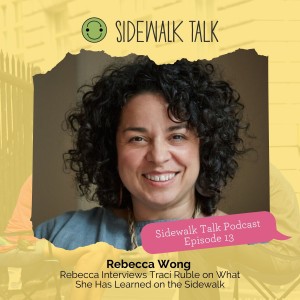
Tuesday Dec 17, 2019
Tuesday Dec 17, 2019
Standout Quotes:
They see my whole mess and they love me anyway. (Traci Ruble)
My heart is never wrong. It's just getting in there that is the challenge. (Traci Ruble)
Boundaries are about finding that balance between connection and protection. (Rebecca Wong)
Rebecca Wong's spirit and her way of being are so audible in the way she speaks, breaths, takes long pauses to take in an interaction fully, and to let connection drive how she relates. I am thrilled you get to meet her here. I hope you will join me in listening to one of my favorite podcasts, up for an award. Find Rebecca's therapy work and her podcast at Connectfulness.
Biography: Rebecca Wong
All of my life, I’ve been fascinated by what it means to be human together.
This has driven me deep into the study of art, film and storytelling, experiential learning, relationships, sexuality, the human reproductive life cycle, the transmission of intergenerational trauma, parenthood, attachment, loss and human behavior, and performance. And the same drive has guided me to deepen my professional studies into Relational Life and Sex Therapy. My experiential teaching style draws from a range of leadership experiences over the past decades ranging from Wilderness Field Instructor to TMI Project Workshop Facilitator.
I admire Rebecca so much even though we have never seen each other in real life. I consider her a wise sage who has balanced challenging the status quo with grace and artistry few have matched, imho. While out wandering through the woods, I had a thought. "Maybe I should talk about why I am doing this podcast on the podcast." But I want to be "in discovery" and "in connection" - not rehearsed.
As I listen to my own words here, I can hear how internal I am. But what is more, you can hear how being 'in connection' as Rebecca does so well, allows you to go deeper. Rebecca captures the essence of my heart and I learned about myself and for that, I am so grateful to get to be in dialogue with her.
You can find more out about Rebecca on her website here.
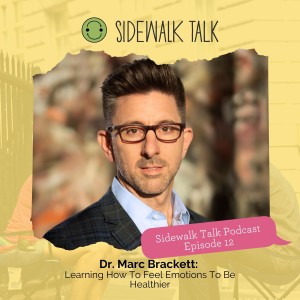
Tuesday Dec 10, 2019
Dr. Marc Brackett On Feeling and Expressing Emotions To Be Healthier
Tuesday Dec 10, 2019
Tuesday Dec 10, 2019
Stand Out Quotes:
We, as adults, have to take responsibility for teaching kids emotional skills. Children who know how to use their feelings wisely are healthier, happier and they are better learners.
We have to give the people we care about permission to feel and express all of their emotions. Emotions are data to help us make better choices in life.
We all overestimate our ability to read another person's feelings.
Biography:
Marc Brackett, Ph.D., is founding director of the Yale Center for Emotional Intelligence and professor in the Child Study Center, Yale School of Medicine at Yale University. His grant-funded research focuses on: (1) the role of emotions and emotional intelligence in learning, decision making, creativity, relationship quality, and mental health; (2) the measurement of emotional intelligence; and (3) the influences of emotional intelligence training on children’s and adults’ health, performance, and workplace performance and climate. Marc has published 125 scholarly articles and has received numerous awards, including the Joseph E. Zins Award for his research on social and emotional learning and an honorary doctorate from Manhattanville College. He also is a distinguished scientist on the National Commission on Social, Emotional, and Academic Development and on the board of directors for the Collaborative for Academic, Social, and Emotional Learning (CASEL).
Marc is the lead developer of RULER, a systemic, evidence-based approach to social and emotional learning that has been adopted by over 2,000 public, charter, and private pre-school through high schools across the United States and in other countries, including Australia, China, England, Italy, Mexico, and Spain. RULER infuses social and emotion learning into the immune system of schools by enhancing how school administrators lead, educators teach, students learn, and families parent. Research shows that RULER boosts academic performance, decreases school problems like bullying, enriches classroom climates, reduces teacher stress and burnout, and enhances teacher instructional practices. Marc is the author of Permission to Feel (Celadon/Macmillan), which will be released in September of 2019.
Show Notes:
In this episode, Dr. Brackett is committed to teaching emotional intelligence as you can hear it deeply touches his own personal story of being bullied in school. He does not create a cheesy "fix it all" mentality to teaching emotional intelligence. Instead, his work is thoughtful, research-backed, and he is calling us all in to do better in understanding our own feelings so we can then understand the feelings of others.
What makes Marc unique is his own willingness to share his vulnerable story, to challenge institutions with grace, and his understanding of social injustices that may not afford some kids and schools the support they need to teach emotional intelligence.
Follow along as you learn about Ruler. And apply it in your own life. This is definitely a book you will want to get and share with your kids, colleagues at work, and in any workplace where you currently live. We need to give each other permission to feel and stop sending the "get over it" or "quit being so emotional" message that is deeply harmful to us humans.
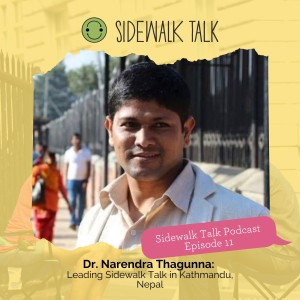
Tuesday Dec 03, 2019
Leading Sidewalk Talk in Kathmandu, Nepal with Dr. Narendra Thagunna
Tuesday Dec 03, 2019
Tuesday Dec 03, 2019
Standout Quotes:
- We need to sit out and listen for four hours in Katmandu because we get a long queue of people waiting to talk and we want to make sure everyone gets heard.
- Nepal is a very welcoming and friendly society but we still suffer from the same mental illness rates as much of the world. Sidewalk Talk is helping make therapists visible in the community.
- Traci, Sidewalk Talk has become so valued, we are looking to bring this to four other cities in Nepal.
Dr. Narendra Thagunna is an advocate for suicide awareness and cross-cultural psychology in Nepal. He teaches and runs a research foundation called Psychdesk.
Sidewalk Talk has become a way to make therapy and sharing what is really on someone’s mind a normal part of life in Dr. Thagunna’s city. In fact, when Sidewalk Talk listeners in Katmandu, all therapists, sit on the sidewalk, they are still offering the same “non-therapeutic listening” but often it becomes a gateway for people to feel comfortable going to the clinic for a second visit if they need it. The community now sees that these therapists are people just like them by being out on the street.
There are big hopes to take Sidewalk Talk up on their community grant program that will supply four more chapters with the tools they need to start a Sidewalk Talk in other parts of Nepal.
This is where you come in. Today is #GivingTuesday. We need 100 people to raise their hand and say “YES! I know this connecting work is the thing that is going to make a real difference in healing all the divides that make people, our communities, our politics, and our planet well.”
Will you be one of the 100 to invest monthly in Sidewalk Talk to sustain Dr. Thangunna’s work and all the other chapters around the world?
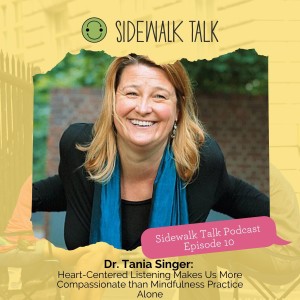
Monday Dec 02, 2019
Monday Dec 02, 2019
Stand Out Quotes:
- Mindfulness in the west has been reduced to mind training to help us to be more efficient but mindfulness was designed to reduce suffering in the world.
- Altruism and social stress only shift if you do relation based practices.
- Fear of not being good enough is ingrained in our culture now so if we can increase care motivation and judge ourselves and others less we could potentially cure social diseases like depression and loneliness.
Dr. Tania Singer is one of the foremost researchers in the world on compassion. She hails from the Max Planck Institute in Berlin, Germany. See her info here.
She set up a very specific experiment that allowed people to practice "contemplative dyads" where a listener and speaker come together to operate in a kind of meditative listening in connection.
She tested three different styles of dyads or pair work. Her findings are stunning.
Just attention based mindfulness does not create any reduction in cortisol stress after three months but an interpersonal practice leads to a 50% reduction in cortisol stress. HUGE! HUGE!
Ever wondered if what we do at Sidewalk Talk directly impacts the world? HERE IS THE PROOF!
Dr. Singer has been a mindfulness practitioner for many years. And she took up a topic of research that, at the time she began, was not cool, and certainly there were not many women doing research as a neuropsychologist at her institute. I hope we can have her on again to talk about the challenges of leading while female. I am looking forward to more work collaborations with Dr. Tania Singer.
And please listen to this interview all the way through the end to hear the very special message Dr. Tania Singer offers to Sidewalk Talk listeners the world over.
Please check out Compassion-Training.org.
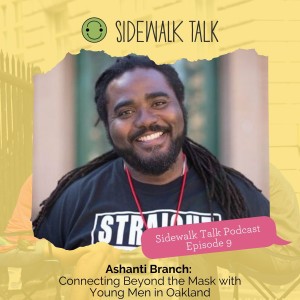
Monday Dec 02, 2019
Connecting Beyond the Mask with Young Men in Oakland
Monday Dec 02, 2019
Monday Dec 02, 2019
Stand out quotes:
I am not doing things to hurt my students when I am firm with them… I am loving them by being firm with them.
When we are in a mentor-led circle…I want to let the wisdom of the circle come forward. I am here to listen.
When my kids are not being saved then I am going to feel like something is wrong with me or something is wrong with you for not being willing to be saved. I have to surrender. My job is not to fix the broken. My job is to say “hey, what do you need”.
Do you want to hear someone who knows how to be real and connect? Ashanti Branch was raised by a single mom on welfare in Oakland, CA. A fateful day, a teacher broke through to him and changed his life and he went on to one of the most prestigious engineering schools.
Yeah, he likes math. If that wasn't enough to admire the guy for excelling at a subject most of us dread...he was making oodles of money and he left it all!
He went back to become a teacher and impact lives... only...it did not go well and he wasn't reaching his kids. Can you imagine what that would be like? To give up your career only to realize "Maybe I am not cut out for this?"
He didn't give up though. Instead, he listened.
This is a story of youth and teaching but if you lead ANYTHING, big or small, Ashanti is also teaching us how to be an equitable, caring, humble, yet strong leader. Leadership requires the ability to listen.
From Fullbright Fellowship, Rotary Fellowship to Teacher of the Year, you won't want to miss the magic that is this human being and clarity that oozes from him.
He is the founder and executive director of the Ever Forward Club that was the subject of the documentary film, The Mask You Live In.
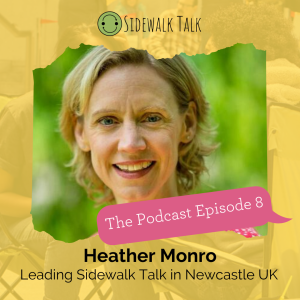
Monday Nov 25, 2019
Leading Sidewalk Talk in Newcastle UK with Heather Monro
Monday Nov 25, 2019
Monday Nov 25, 2019
Stand Out Quotes From This Episode
We can become more than who we are through our connection with others.
Being in connection with people who were very different than me was almost safer than with people like me because I didn't have to be like them.
At the root of the climate crisis is the growth economy which at its roots are the need to be seen.
Heather Monro is a leadership coach, a former athlete, and a parent. She is a self-described passionate student of human connection. You can learn about her work at Bright Space Thinking.
She has always found great personal meaning through her connections as a young girl so this idea of leading a Sidewalk Talk chapter was in her DNA.
Hear about Heather's fears of being rejected on the sidewalk before her very first listening event.
None of those fears came true.
Instead, what surprised her, is that being in connection with people who are different felt really good because she was liberated from judgment.
Heather learns more about herself, but she gets a sense of being seen as a whole human being at the same time that she is listening.
Sidewalk Talk really challenges Heather's biases and social conditioning.
If you are moved by Heather's work and the work of Sidewalk Talk, consider investing monthly in Sidewalk Talk so we can keep our impact alive.
You can invest your time or your dollars monthly and become one of us.
On Dec 3, for #GivingTuesday, we are looking for 100 monthly investors. Learn more here.
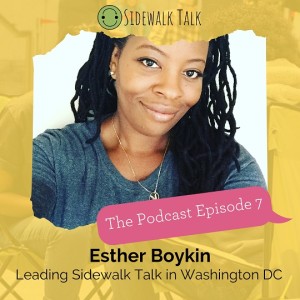
Sunday Nov 17, 2019
Leading Sidewalk Talk in Washington DC with Esther Boykin
Sunday Nov 17, 2019
Sunday Nov 17, 2019
Stand Out Quotes
- I think therapists need to be more visible outside their offices and be seen as accessible warm people.
- We forget how important belonging is to almost every aspect of our wellness.
- Part of how we define who we are in the world is through our connection to other people.
Esther Boykin was the very first city leader outside of California to bring listening to her community. Sidewalk Talk turned into an organization, if you really think about it, because of Esther nudging Traci to bring Sidewalk Talk out to the East Coast.
Esther is a psychotherapist, a group practice owner, leads Sidewalk Talk in the DC area, as well as runs a project called “Therapy is Not A Dirty Word”.
She listens because she believes love needs to be the centerpiece of her community and at the root for her, sitting out on the sidewalk and offering to listen to members of her community is the way to make that happen.
Listening on the sidewalk is unique because unlike therapy, you don’t self-select who you are going to listen to based on a person’s background, religious beliefs, and political stance. Esther believes that is important because we can get caught in political conversations or policy conversations and forget that there are real people with real stories that we have to hear to really do right by people.
Part of why Esther became a therapist is because she believes our wellness is tied to our connection with one another and when we can broaden those connections the better we become.
If you want to support more leaders like Esther bringing love and connection back to the world, consider becoming a monthly investor in Sidewalk Talk. It is #GivingTuesday on December 3 and we need 100 monthly investors to sustain the impact of Sidewalk Talk across 92 locations and 15 countries in 2020. Find out more here.
And you can learn more about Esther Boykin and her work at Therapy Is Not A Dirty Word, Esther Boykin, and Group Therapy Associates.
